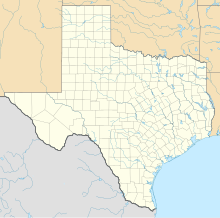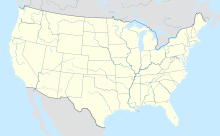| Lyndon Baines Johnson Library and Museum | |
|---|---|
 | |
 The Lyndon Baines Johnson Library and Museum in 2017 The Lyndon Baines Johnson Library and Museum in 2017 | |
  | |
| General information | |
| Location | 2313 Red River St, Austin, Texas, United States |
| Coordinates | 30°17′09″N 97°43′45″W / 30.2857°N 97.7292°W / 30.2857; -97.7292 |
| Named for | Lyndon B. Johnson |
| Inaugurated | Dedicated on May 22, 1971 |
| Management | National Archives and University of Texas at Austin |
| Technical details | |
| Size | 14 acres (5.7 ha) |
| Design and construction | |
| Architect(s) | Gordon Bunshaft of Skidmore, Owings & Merrill |
| Website | |
| www | |
| ||
|---|---|---|
|
Senator from Texas 37th Vice President of the United States 36th President of the United States
First term
Second term
Presidential and Vice presidential campaigns
Post-presidency
|
||
The Lyndon Baines Johnson Library and Museum, also known as the LBJ Presidential Library, is the presidential library and museum of Lyndon Baines Johnson, the 36th president of the United States (1963–1969). It is located on the grounds of the University of Texas at Austin, and is one of 13 presidential libraries administered by the National Archives and Records Administration. The LBJ Library houses 45 million pages of historical documents, including the papers of President Johnson and those of his close associates and others.
History
Discussions for a Presidential library for President Johnson began soon after his 1964 election victory. In February 1965, the chairman of the Board of Regents at the University of Texas at Austin, William H. Heath, proposed building the library on the university campus, along with funds to construct the building and the establishment of the Johnson School of Public Affairs on the campus. The agreement was formally reached on September 6, 1966. While past Presidential libraries were funded by private donations, the publicly-funded University of Texas paid $15 million of the $18 million needed to construct the complex and donated the land for the library, which was formerly a low-income neighborhood acquired by the university using eminent domain.
First Lady Lady Bird Johnson toured existing Presidential libraries and university campuses to consult the design of the library. Lady Bird presented three potential architects to President Johnson; Gordon Bunshaft of Skidmore, Owings & Merrill was chosen. The design was completed in the Summer of 1966 and construction began in 1967. The Library was dedicated on May 22, 1971, with Johnson and then-President Richard Nixon in attendance.
In 1991 Queen Elizabeth II visited the museum and met with President Johnson's family, as he was the only president she never met; her only opportunity to meet him was when Winston Churchill was buried in 1965; but he was sick with the flu and bronchitis and hospitalized at the time of the passing and was prohibited by his physicians from leading the U.S. delegation to the funeral. He "very, very much" wanted to attend the funeral that the Queen arranged a private meeting with him at Buckingham Palace after the funeral before his doctors barred him from going.
After her death in July 2007, the body of Lady Bird Johnson lay in repose in the Library and Museum, just as her husband's had after his death, 34 years earlier in January 1973.
In 2012, the LBJ Library underwent a multimillion-dollar redesign, during which most of the exhibits were closed. On December 22, the Library reopened to the public. In 2013, the Library began charging admission for the first time since its dedication in 1971.

Features
The complex, which was designed by Skidmore, Owings & Merrill architects Gordon Bunshaft and R. Max Brooks, is an unadorned 10-story building clad in cream Italian travertine. Library, adjacent to the Lyndon B. Johnson School of Public Affairs, occupies a 14-acre (57,000 m) campus. Although the Library is on the grounds of UT Austin, it is federally run and independent from the University. The top floor of the Library has a 7/8ths scale replica of the Oval Office decorated as it was during Johnson's presidency, including the Johnson desk. Another exhibit features an animatronic LBJ. The view of the Texas State Capitol from the library's terrace became one of the Capitol View Corridors protected under state and local law from obstruction by tall buildings in 1983.
The LBJ Library provides year-round public viewing of its permanent historical, cultural, and temporary exhibits to approximately 125,000 visitors each year. It is open from 9 a.m. until 5 p.m. seven days a week throughout the year. The Library is closed on Thanksgiving, Christmas, and New Year's Day.
Among the artworks on display at the Library and Museum is a photoengraved mural depicting scenes from Johnson's life created by Naomi Savage.
LBJ Liberty & Justice for All Award
The library honors public servants with the "LBJ Liberty & Justice for All Award". The award is given to leaders who demonstrate civility and bipartisanship.
Recipients:
- 2010: John Lewis
- 2013: George H. W. Bush
- 2014: John Dingell and Carl Levin
- 2015: Jim Clyburn and Eric Holder
- 2016: Jimmy Carter
- 2017: David Rubenstein
- 2018: John McCain
- 2019: Nancy Pelosi
- 2020: Ruth Bader Ginsburg
- 2023: Willie Nelson
- 2024: Joe Biden
See also
References
- "Facts about the Lyndon B. Johnson Library and Museum". Archived from the original on February 1, 2014. Retrieved December 1, 2013.
- ^ "Lady Bird Johnson: The Mastermind Behind the LBJ Presidential Library". U.S. National Archives. October 23, 2015. Retrieved April 6, 2020.
- "History of LBJ Presidential Library". LBJ Presidential Library. Retrieved April 6, 2020.
- Cartwright, Gary (October 17, 1971). "The L. B. J. Library: The Life and Times Of Lyndon Johnson in Eight Full Stories". The New York Times. Retrieved April 6, 2020.
- Charter, David (2024). Royal Audience: 70 Years, 13 Presidents: One Queen's Special Relationship with America. New York: G.P. Putnam's Sons. p. 79. ISBN 978-0593712870.
- ^ Smith, Sally Bedell (2012). Elizabeth the Queen: inside the life of a modern monarch. New York: Random House. pp. 177–178. ISBN 9781400067893.
- Pitofsky, Marina (September 8, 2022). "Queen Elizabeth met every US president since Truman – except one: See her visits with US leaders". USA Today.
- Cooper, Zaki (February 6, 2022). "Ahead of Platinum Jubilee, a look at Queen Elizabeth's diplomacy in US and Chicago". The Chicago Tribune. p. 16.
Over the seven decades of her reign, she...met with 13 of the 14 presidents...starting with President Harry Truman. The odd one out was Lyndon Johnson, who was prohibited by his physicians from traveling to Britain for the funeral of Winston Churchill in 1965, when he would undoubtedly have met the queen.
- Mohr, Charles (January 25, 1965). "President Hopes to Go to London; Health Improves". The New York Times. p. 1.
- Folliard, Edward T. (January 25, 1965). "Unprecedented US Honors Ordered". The Washington Post. p. A1.
- Moritz, John. "Lady Bird Johnson Lies In Repose". The Spokesman. Retrieved July 8, 2013.
- Esto Gallery: Presidential Libraries
- "Downtown Development and Capitol View Corridors" (PDF). Downtown Austin Commission. June 27, 2007. Retrieved November 10, 2017.
- "Library & Museum". LBJ Presidential Library. Austin, Texas: U.S. National Archives and Records Administration. Retrieved November 19, 2014.
- "Plan Your Visit". LBJ Presidential Library. Retrieved July 2, 2013.
- LBJ Presidential Library (November 22, 1963). "Photo-engraving mural wall by Naomi Savage at the LBJ Library". LBJ Presidential Library. Retrieved March 5, 2017.
- "LBJ Liberty & Justice for All Award | LBJ Foundation". www.lbjaward.org. Retrieved April 16, 2023.
- "LBJ Foundation Honors Rep. John Dingell and Sen. Carl Levin with LBJ Liberty & Justice for All Award" (Press release). Austin, Texas: LBJ Presidential Library. November 18, 2014. Retrieved November 19, 2014.
- "Instagram".
Further reading
- Benjamin Hufbauer, Presidential Temples: How Memorials and Libraries Shape Public Memory (registration required) (University Press of Kansas, 2005). See 3: "Symbolic Power, Democratic Access, and the Imperial Presidency: The Johnson Library" (registration required).
External links
| United States presidential library system | |
|---|---|
| Non-NARA libraries |
|
| National Archives and Records Administration libraries | |
| Related | |
| City of Austin | |||||||||||
|---|---|---|---|---|---|---|---|---|---|---|---|
| Slogan: Live Music Capital of the World | |||||||||||
| Attractions | |||||||||||
| History | |||||||||||
| Education |
| ||||||||||
| Government | |||||||||||
| Industry |
| ||||||||||
| Museums |
| ||||||||||
| Music | |||||||||||
| Neighborhoods |
| ||||||||||
| Parks and recreation | |||||||||||
| Transportation |
| ||||||||||
| Culture | |||||||||||
| Sports | |||||||||||
- 1971 establishments in Texas
- Civil rights movement museums
- History museums in Texas
- Library buildings completed in 1971
- Libraries in Austin, Texas
- Lyndon B. Johnson
- Museums established in 1971
- Museums in Austin, Texas
- Presidential libraries
- Presidential museums in Texas
- Skidmore, Owings & Merrill buildings
- University of Texas at Austin campus
- University and college buildings completed in 1971




